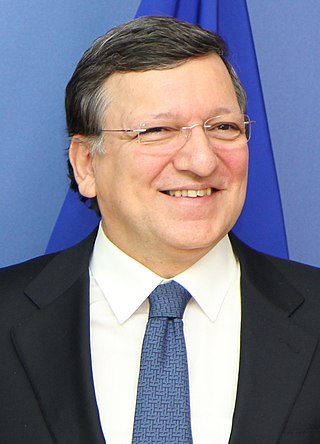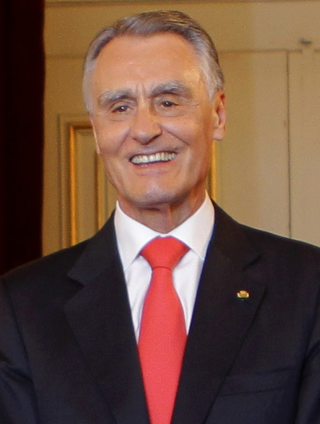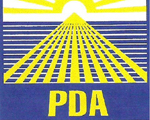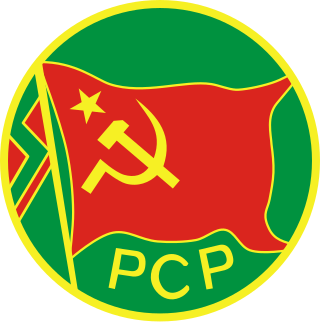
Politics in Portugal operates as a unitary multi-party semi-presidential representative democratic republic, whereby the Prime Minister of Portugal is the head of government, and the President of Portugal is the non-executive head of state with several significant political powers they exercise often. Executive power is exercised by the Government, whose leader is the prime minister. Legislative power is primarily vested in the Assembly of the Republic, although the government is also able to legislate on certain matters. The Judiciary of Portugal is independent of the executive and the legislature. The President exerts a sort of "moderating power", not easily classified into any of the traditional three branches of government.

José Manuel Durão Barroso is a Portuguese politician and law professor. He previously served as the 114th prime minister of Portugal and from 2004–2014 as the 11th president of the European Commission.

The Portuguese Communist Party is a communist, Marxist–Leninist political party in Portugal based upon democratic centralism. The party also considers itself patriotic and internationalist, and it is characterized as being between the left-wing and far-left on the political spectrum.

The Communist Party of Brazil is a political party in Brazil. The PCdoB officially adheres to Marxist–Leninist theory. It has national reach and deep penetration in the trade union and student movements, but little representation in elected positions.

The Social Democratic Party is a liberal-conservative political party in Portugal. Commonly known by its colloquial initials PSD, on ballot papers its initials appear as its official form PPD/PSD, with the first three letters coming from the party's original name, the Democratic People's Party. A party of the centre-right, the PSD is one of the two major parties in Portuguese politics, its rival being the Socialist Party (PS) on the centre-left.

The CDS – People's Party is a conservative and Christian democratic political party in Portugal. It is characterized as being between the centre-right and right-wing of the political spectrum. In voting ballots, the party's name appears only as the People's Party, with the abbreviation CDS–PP unchanged.

The Ecologist Party "The Greens" is a Portuguese eco-socialist political party. It is a member of the European Greens and a founding member of the European Federation of Green Parties.

Ana Maria Rosa Martins Gomes, better known as Ana Gomes, is a Portuguese former diplomat and politician of the Socialist Party (PS).

Presidential elections were held in Portugal on 22 January 2006 to elect a successor to the incumbent President Jorge Sampaio, who was term-limited from running for a third consecutive term by the Constitution of Portugal. The result was a victory in the first round for Aníbal Cavaco Silva of the Social Democratic Party candidate, the former Prime Minister, won 50.54 percent of the vote in the first round, just over the majority required to avoid a runoff election. It was the first time in which a right-wing candidate was elected President of the Republic since the 1974 Carnation Revolution.

The Democratic Party of the Atlantic was a political party, based in the Portuguese archipelago of the Azores. A regional party, whose electorate was concentrated on the islands of São Miguel, it was created by former supporters of the New State. it seldom obtained more than 1% of the votes in regional or national elections.

General Vasco dos Santos GonçalvesOA was a Portuguese army officer in the Engineering Corps who took part in the Carnation Revolution and later served as the 104th Prime Minister from 18 July 1974 to 19 September 1975.

The Marxist–Leninist Students' Federation was the students wing of the MRPP. FEML played an important role in the early years of the party.
Nagalingam Shanmugathasan was a trade unionist and Maoist revolutionary leader in Sri Lanka. He was the General Secretary of the Ceylon Communist Party (Maoist)

The Partido Comunista de España (Reconstituido) is a Spanish clandestine communist party that broke away from the Communist Party of Spain (PCE). The general secretary of the PCE(r) is Manuel Pérez Martínez, currently in jail.

The history of the Portuguese Communist Party, spans a period of 102–103 years, since its foundation in 1921 as the Portuguese section of the Communist International (Comintern) to the present. The Party is still an active force within Portuguese society.
The Democratic Renewal Party was a political party in Portugal, founded in 1985 with the political support of the then independent President of the Republic, Ramalho Eanes, and lasting until 2000. At the time of its foundation, it was meant to "moralize Portuguese political life" and the party positioned itself in the political centre. Its first leader was Hermínio Martinho.

The 2009 European Parliament election in Portugal was the election of the delegation from Portugal to the European Parliament held on 7 June 2009.
Marxism–Leninism–Maoism (MLM) is a political philosophy that synthesizes and builds upon Marxism–Leninism and the thought of Mao Zedong. Marxism–Leninism–Maoism was first formalized by the Shining Path in 1982.
The First Great Rectification Movement refers to a 1965 ideological movement by Filipino communists led by Jose Maria Sison wherein they "criticized, repudiated and rectified the major ideological, political and organizational errors and weaknesses" of the 1930s-era Communist Party of the Philippines. This rectification movement led to the reestablishment of the Communist Party of the Philippines on December 26, 1968 along Marxist–Leninist–Maoist Thought.


















